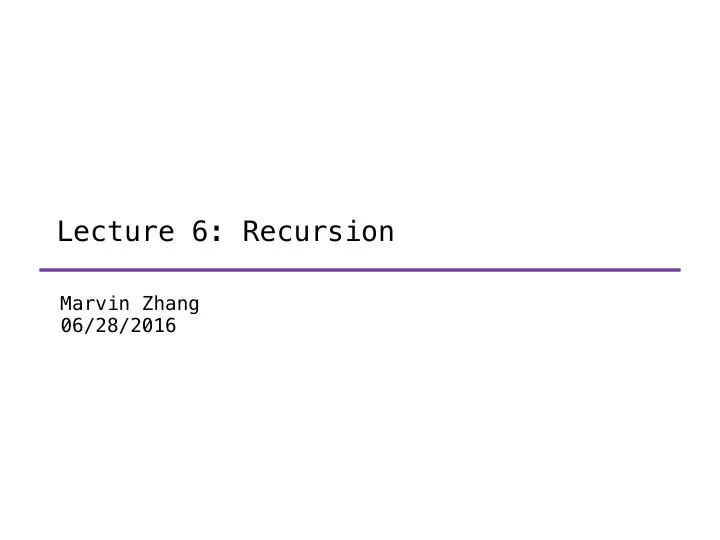

Lecture 6: Recursion Marvin Zhang 06/28/2016
Announcements Hog is due Thursday! Submit Wednesday for 1 EC point • Be sure to run --submit to check against hidden tests • HW2 is due Wednesday! Submit Wednesday for credit • Tutors have begun small tutoring sessions! • Check Piazza for details • Starting this week, lab assistants are running checkoffs • in lab sections! Talk to a lab assistant for a few minutes about your • lab or homework assignment http://cs61a.org/articles/about.html#checkoffs • Quiz 2 is this Thursday • Alternate Exam Request: goo.gl/forms/FDQix4I5dNXPQDgw2 •
Roadmap Introduction Functions This week (Functions), the goals are: • Data To understand the idea of • functional abstraction Mutability To study this idea through: • higher-order functions • Objects recursion (today and tomorrow!) • Interpretation orders of growth • Paradigms Applications
Recursion A function is recursive if the body of that function • contains a call to itself This implies that executing the body of a recursive • function may require applying that function How is this possible? We’ll see some examples next. •
(demo) Recursion Why would we want to do this? • A common problem solving technique is to break down the • problem into smaller problems that are easier to solve This is exactly what recursion does! • For example, how would you write a function that, given • a string, returns the reversed version of the string?
Anatomy of a Recursive Function The def statement header is similar to other functions • Conditional statements check for base cases • Base cases are evaluated without recursive calls • Recursive cases are evaluated with recursive calls • def factorial(n): """Return the factorial of n.""" if n == 0: return 1 else : return n * factorial(n-1)
Verifying Correctness The easy way, and the right way
Recursion in Environment Diagrams (demo) • The same function fact is called multiple times • Different frames keep track of the different arguments in each call • What n evaluates to depends upon the current environment • Each call to fact solves a simpler problem than the last: smaller n
Better: the Recursive Leap of Faith def factorial(n): """Return the factorial of n.""" if n == 0: return 1 else : return n * factorial(n-1) Now, harness the power of Is factorial implemented correctly? functional abstraction ! 1. Verify the base case(s). 2. Assume that factorial(n-1) is correct. 1. Are they correct ? 3. Verify that factorial(n) 2. Are they exhaustive ? is correct.
(demo) Writing Recursion def sum_digits(n): """Return the sum of the digits of n. >>> sum_digits(2016) 9 """ if n == 1: if n < 0: return 1 return 0 if n < 10: if n < 100: return n return n
(demo) Writing Recursion def sum_digits(n): """Return the sum of the digits of n. >>> sum_digits(2016) 9 """ if n < 10: return n else : return sum_digits(n//10) + n%10
(demo) Iteration vs Recursion • Iteration is a special case of recursion • Converting iteration to recursion is formulaic, but converting recursion to iteration can be more tricky Using iteration: Using recursion: def fact_iter(n): def fact(n): total, k = 1, 1 if n == 0: while k <= n: return 1 total, k = total*k, k+1 else : return total return n * fact(n-1) n ( 1 if n = 0 Y Math: n ! = k n ! = n · ( n − 1)! otherwise k =1 Names: n, total, k, fact_iter n, fact
(demo) Recursion on Sequences We’ve seen iteration as one way of working with • sequences, but iteration is a special case of recursion This means that we can also use recursion to solve • problems involving sequences! def reverse(word): """Return the reverse of the string word.""" if len(word) < 2: return word else : return reverse(word[1:]) + word[0]
Summary Recursive functions call themselves, either directly or • indirectly, in the function body The motivation for this is to break down the problem • into smaller, easier to solve problems For example, computing the factorial of a smaller • number, or the reverse of a shorter string Recursive functions have base cases , which are not • recursive, and recursive cases The best way to verify recursive functions is with • functional abstraction! Use the leap of faith •
Recommend
More recommend